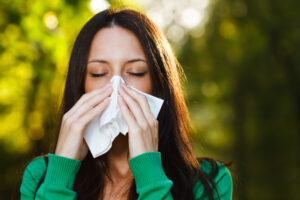April 01, 2021 | Black & Kletz Allergy

Since the signs and symptoms of the 3 conditions (i.e., allergic rhinitis, nonallergic rhinitis, common cold) may be very similar and overlap, it is important for the allergist to distinguish them in order to manage them more effectively.
The classic symptoms of hay fever or allergic rhinitis may include sneezing, itchy nose, runny nose, nasal congestion, post-nasal drip, itchy throat, itchy eyes, watery eyes, redness of the eyes, and/or puffy eyes. Some individuals will also experience sinus congestion, sinus headaches, snoring, and/or fatigue. Fever and/or chills is not usually present despite the name “hay fever.”
The typical symptoms of nonallergic rhinitis is similar to that of allergic rhinitis although the itchiness is usually not present. Thus, the symptoms are typically sneezing, runny nose, post-nasal drip, and/or nasal congestion. Some patients may also complain of sinus headaches and/or sinus congestion. Ocular symptoms may include watery eyes and/or redness of the eyes.
The common cold is caused by an infection with a virus. The symptoms of a “cold” are similar to those of nonallergic rhinitis although, in addition, fever, chills, and/or muscle aches may also be present. Eye symptoms and itchiness is generally not a feature of the common cold. The length of time of the discomfort is usually far less than that of patients with either allergic rhinitis or nonallergic rhinitis, since viruses are usually self-limited and the average length of time of a “cold” is generally less than 7 days. The symptoms of allergic rhinitis or nonallergic rhinitis in the Spring may last the entire pollen season which may be up to 4-5 months in duration. Of course, many individuals may be allergic to other allergens such as weeds, dust mites, and/or pet dander which can complicate the matter and cause the person to experience symptoms at other times of the year or have perennial symptoms.
The treatment of the 3 conditions is different and it is thus important to know which malady is present in an individual. The management of allergic rhinitis may include antihistamines, decongestants, nasal corticosteroids, nasal antihistamines, nasal anticholinergics, leukotriene antagonists, ocular antihistamines, ocular mast cell stabilizers, ocular nonsteroidal anti-inflammatory agents (NSAIDs), and/or ocular corticosteroids. Allergy immunotherapy (i.e., allergy shots, allergy desensitization, allergy hyposensitization) is very efficacious in the treatment of allergic rhinitis as it helps in 80-85% of individuals who take it. Allergy shots, on the other hand, are not prescribed in patients with nonallergic rhinitis or the common cold.
The treatment of nonallergic rhinits is similar to the management of allergic rhinitis however, nasal corticosteroids are the primary method of treating this condition. It is unnecessary to use leukotriene antagonists and less important to use oral, nasal, and ocular antihistamines. As mentioned above, allergy immunotherapy is not used to treat nonallergic rhinitis.
The management of the common cold is based on treating the symptoms only as viruses are self-limiting and the symptoms of the common cold will generally disappear within 7 days of the onset of the cold. The treatment is similar to that of nonallergic rhinitis with the exception of the use of eye drops since patients with the common cold do not generally exhibit ocular symptoms. In addition, the use of acetaminophen (i.e., Tylenol) or nonsteroidal anti-inflammatory drugs (NSAIDs) (e.g., ibuprofen, naproxen) may be desired in order to help alleviate associated fevers, chills, and/or muscle aches.
The board certified allergists at Black and Kletz Allergy have over 50 years of experience in diagnosing and treating allergic rhinitis, nonallergic rhinitis, and the common cold. We treat both adult and pediatric patients. Black & Kletz Allergy has 3 convenient locations with on-site parking located in Washington, DC, McLean, VA (Tysons Corner, VA), and Manassas, VA. The Washington, DC and McLean, VA offices are Metro accessible and we offer a free shuttle that runs between our McLean, VA office and the Spring Hill metro station on the silver line. To make an appointment, please call any one of our offices directly or you may click Request an Appointment and we will respond within 24 hours by the next business day. The allergists at Black & Kletz Allergy have been servicing the greater Washington, DC metropolitan area for more than 5 decades and we look forward to providing you with the best state-of-the-art allergy care in a pleasant and hospitable environment.












